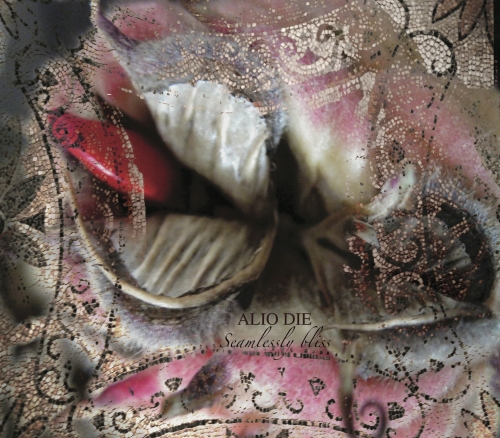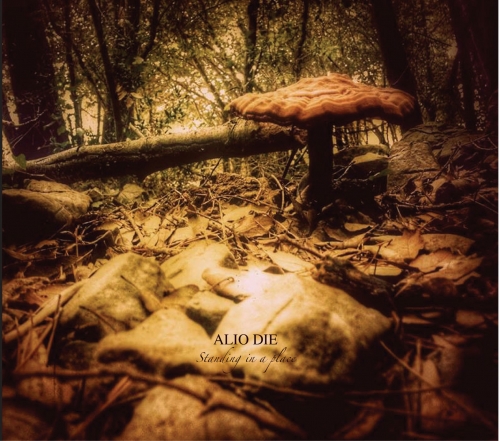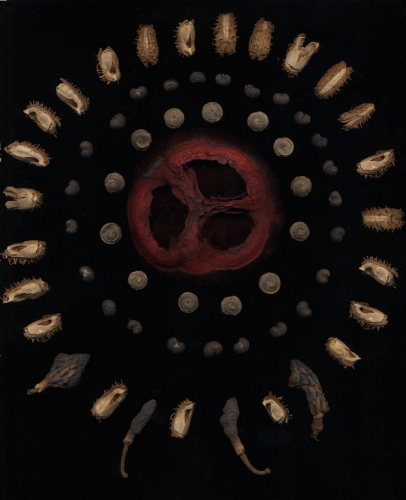Your new albums Seamlessly bliss and Standing in a place deal with many symbols, as all Your albums. What inspired You to create them?
If you refer with my album’s artwork, yes there are many symbols as organic life and mushrooms, as mosaics and ancient art, as labyrinths. I like when the artwork combines different layers and evoke an abstract image not understandable at all at the first moment. The inspiration of these new albums comes from about 25 years of research and practice with sounds, inspiration is sometimes about learn how to listening, and how to tune deep and deeper in the psycho-acoustic effects of sound, in the way to combine the elements in a multilayer perspective, and in a personal and subtle way, letting the sound goes in depth while the mixing process is developed.
My main inspiration is observe nature and cosmos, flowing in and over the time…

What collaborations were/are the most interesting and important to You and why?
Every collaboration display a special value for me, during the years… one of the first and most important collaborations for me at the beginning of my musical adventure it was with Robert Rich for the recordings of “Fissures" in California… As for the great connections with Robert about nature and music, and for the great studio experience. Every collaboration explores from a large range of possibilities, for example the four collaborations published on Projekt, with singers, combining the sounds of the voice with acoustic sounds, drones and loops. The first of the series is the album with Amelia Cuni “Apsaras”, then "Eleusian Lullaby” with Martina Galvagni, “Mei-Jyu” with Jack or Jive, "Amidst the circling spires” with Sylvi Alli.
It was also interesting to me recordings together with Zeit, Aglaia, and Lorenzo Montanà, as for the similar approach to electronic and ambient sounds so that the creative work flows easily to define his form and feelings. The collaboration with Lingua Fungi was also very fascinated to me as for the recordings of "Otter Songs” as for my trip into the beautiful and inspiring Finnish landscape, and the perfect understanding with Jaakko during the recording sessions... some sounds of them are included also in my forthcoming and new albums “Seamlessly bliss”, "Imaginal symmetry" and "Unfathomable convergence" but mostly of the original sessions will be edited later.

What are the main ideas behind Your music? Could You name Your favourite Your compositions / albums / collaborations?
Music is for his nature over words and sometimes also preconceived ideas can be a difficulty on the flowing of the natural process of composition into sounds. Ideas are usually more close of what elements, instruments or tunings to start, or about the kind of atmosphere. it is quite clear to me that all the images and fascinations that can be attribute to my sounds-world are over my conscious intentions… In fact, when you can just induce, throw sound, quiet moments and connection feelings by body and sounds, than all the magic can appear itself and sustain in the listening experience.
Some of my favorite albums that shows perfectly into this matter are “Password for Entheogenic Experience”, “Aura seminalis”, “Horas tibi serenas” but also all four latest albums.

John Cage proved that there's no silence. Also, the sound is magic. But, what ends, when there is no sound?
When is no sound it can be the place when a sound start or a sound expand and resonate at his best… Silence is a condition of the soul first to be an environmental plateau for listening pleasure.
What is and what is not a Sound Art?
Actually I’m not personally interested in define what is art and what it isn’t… But as well Sound Art for me it is a sound that explain itself from the inside, connected with the soul and the heart of life, and so you’ll find in it a kind of resonance connecting with, by listening.
What do You think about relations between the old art and computer art? Are they compatible?
It is a fact that using more “primitive” electronic instruments it gives a different approach to composition, comparing than now with computers we used today for recordings, and software instruments have change the way of works in studio, and multitrack recordings. probably it is now sometimes less spontaneously but it doesn’t mean that the music before computer era is more interesting just for this…
I agree that the risk using too much computer it is to have a homogeneous large number of artists with a similar sound… But as well I know artists that can use this new technology at a very high creative point.
What do You think about thousands of neofolk/industrial/ambient/tribal/electroacoustic/avant-garde etc. bands/projects? Is it a kind of trend, o just a tendency forwards better music?
I see the scene is very colorful, and I listen from years quite a lot of all of that… as well every sub-genre counts a big numbers of the proposal, but I think the quality of the music and artworks is at a good level… Especially into neo-folk, and ambient.
What do You know about Lithuania? How and when did You come to it? What Lithuanian and foreign musicians do You value most?
I’m not into Lithuania’s music, but I heard a lot of ancient folk and vocal music from Iļģi (Riga) and a lot of Finnish and Scandinavian new folk music that I appreciate very much.
I ‘m invided for playing live at the Mėnuo Juodaragis festival 2016 that will take place 26–28 August 2016, at the island of Lake Dūburys... The location looks wonderful and I look forward very much to it!
You are a multiinstrumentalist. What do You think about field recordings?
Sound sources as field recordings are something like the ingredients that are used in a composition to find a particular taste sometime simple and direct and in some other more complicate and layered. They can also be the atmospherical starting point, to add on. I think is very important follow an intuitive choose of these ingredients during the process of organisation of sounds, as well as for the treatments that are added later.
At the first step, I made recordings with a portable digital recorder. Environmental sounds, of animals in nature or inspired improvisations played with acoustic instruments and objects, are then selected and edited. Every sound have his quality that reflect his vibratory quality in poetry, the evocative symbolism, colors and forms...
... resulting that sometimes the border between a special connection between the sounds, or just a total chaos, it is very fine… so the choose of the subjects and mixing levels should be very accurate.
Links: